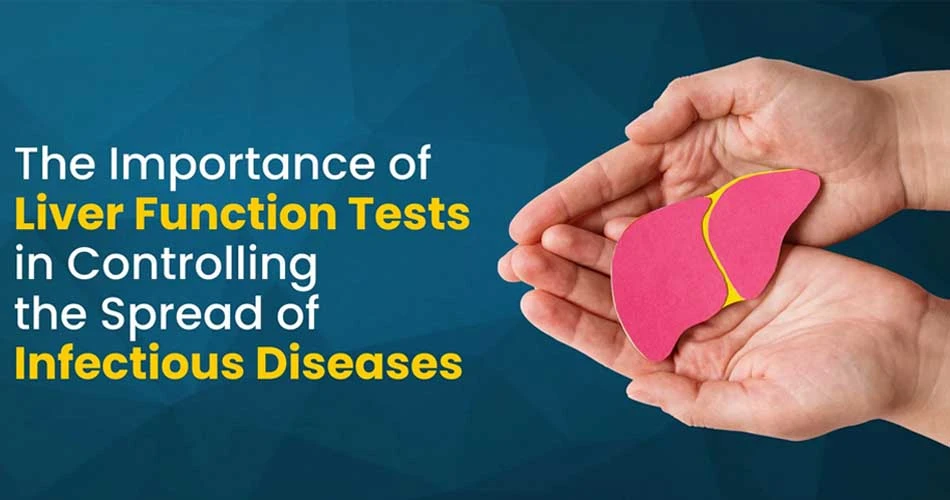The Importance of Liver Function Tests (LFTs) in Controlling the Spread of Infectious Diseases
Aug 08, 2023

The liver is an organ with a diverse range of essential functions such as detoxification, metabolism and synthesis of proteins. Infectious diseases can have a deep impact on liver health, and hence, controlling their spread is extremely important.
Liver Function Tests (LFTs) are a group of blood tests that assess the health and functionality of the liver and thereby help to control the spread of infectious diseases like hepatitis, tuberculosis, malaria etc. Let us explore the significance of LFTs in controlling the spread of infectious diseases, understand the causes and risk factors of these diseases and learn when to consider getting tested.
What is a Liver Function Test (LFT)?
Liver Function Tests (LFTs) are a series of blood tests that help healthcare providers assess the liver's health and its ability to perform vital functions like producing bile for digestion, metabolic processes, production of proteins and cleansing of blood from wastes and toxins. The common LFTs are Bilirubin, Alkaline Phosphatase (ALP), Albumin and total protein, Gamma-glutamyl transferase (GGT), Aspartate transaminase (AST), Alanine transaminase (ALT).
LFTs can diagnose and monitor any liver disease and help doctors to monitor the effectiveness of any ongoing medical treatment. The actual LFT is a simple process wherein a trained phlebotomist or nurse will collect a small blood sample from a vein in your arm. The area would be cleaned with an antiseptic, and an elastic band would be tied around your arm to make the veins more prominent. Later on, a needle will be inserted into the vein to draw the blood, and the sample will be collected in a sterile tube. This process takes hardly two minutes and is relatively painless.
The blood sample is processed using automated machines and analysed for various liver function markers in the laboratory. The analysis is completed within a day or two, and the results are handed over to the individual. This early detection can help control the spread of infectious diseases and prevent severe complications.
Causes of Liver Dysfunction Due to Infectious Diseases
When the liver’s functionality is affected, it becomes more susceptible to infections. Infectious diseases can directly or indirectly cause liver problems, leading to certain health complications. Let us understand how these infectious diseases can affect the normal functioning of the liver.
- Bacterial Infections
Liver dysfunction can weaken the immune response and make the body more vulnerable to bacterial infections. Bacteria can directly infect the liver, enter the bloodstream from other sites, and spread to the liver. Sepsis, pyogenic liver abscess and bacterial endocarditis are examples of bacterial infectious diseases.
are examples of bacterial infectious diseases.
- Viral Hepatitis
Hepatitis viruses (A, B, C, D and E) primarily target liver cells and cause inflammation and liver damage. Similarly, chronic viral hepatitis can eventually progress to liver cirrhosis and cause servere liver complications.
- Malaria
This mosquito-borne infectious disease may lead to liver dysfunction due to excessive destruction of red blood cells and subsequent release of heme. It increases the liver's detoxification capacity and requires early detection through Liver Function Tests.
- Tuberculosis (TB)
Though tuberculosis is a respiratory disease, it can disseminate through the bloodstream and infect the liver. This type of TB is called hepatic tuberculosis. LFTs conducted at a registered diagnostic centre can help to get a rapid cure for infectious diseases.
- Covid-19
COVID-19 is also a respiratory illness, but research has proved it can also impact the liver. In some severe cases of COVID-19, patients have encountered liver damage due to the SARS-CoV-2 virus's direct impact on liver cells.
- Fungal and Parasitic Infections
Fungal infections like candidiasis and aspergillosis can affect the liver as a result of the weak immune system. Additionally, certain parasitic infections can directly affect the liver and cause amoebic liver abscesses or fascioliasis.
- HIV/AIDS
The human immunodeficiency virus (HIV) can indirectly distress the liver by weakening the immune system. The liver's ability to defend against infections is considerably reduced as the immune system declines, and the body is at risk of opportunistic liver infections.
Risk Factors
Liver diseases may not cause noticeable signs and symptoms. Nevertheless, certain risk factors can increase your risk of liver dysfunction. These risk factors include:
- Heavy alcohol consumption
- Unprotected sex
- Type 2 diabetes
- Obesity
- Exposure to other individuals’ blood or body fluids
- Family history or genetics of liver disease
- Taking certain over-the-counter (OTC) medications
- Sharing needles for any drug injection
When to go for an LFT?
Consistent monitoring of liver function is essential, especially for individuals at high risk of liver complications. You can consider getting a liver function test if you have the following:
- Weakness
- Weight loss
- Abdominal pain
- Vomiting
- Chronic fatigue
- Loss of appetite
- Pale stool colour
- Dark urine colour
- Swelling in the ankles and legs
- Skin and eyes appear yellowish
Conclusion
Liver Function Tests (LFTs) are invaluable in assessing liver health and detecting infectious diseases. LFTs are available at Apollo Diagnostic to proactively protect your liver health by understanding the causes, risk factors and potential complications of liver involvement in infectious diseases.
In the comfort of your home, you can easily take LFT, and our experts will provide the results on the same take itself! Regular LFTs, appropriate medical management and certain lifestyle modifications can control the spread of infectious diseases and promote overall well-being. Visit our website today and book your test today!
FAQs about Liver Function Tests and Liver Health
1. Can LFTs detect liver damage caused by infectious diseases?
Yes, LFTs can detect liver damage caused by infectious diseases. Increased levels of liver enzymes like ALT and AST can indicate liver inflammation and injury. Additionally, abnormal bilirubin levels can suggest impaired liver function and bile flow.
2. When can a physician recommend LFTs?
If your physician notice symptoms like excessive weakness, loss of energy, extreme weight loss, abdominal pain and swelling, nausea, loss of appetite, vomiting or change in stool colour and urine colour, you may be asked to go for LFTs.
3. Are the LFTs done on an empty stomach?
Yes. Liver Function Tests are usually conducted on an empty stomach, where the person is not supposed to eat or drink anything except water before the test. If you are on medication, you should consult your healthcare provider before taking the test, as certain medicines or health supplements may affect the LFT result.
Related Blog Post
Blog Categories
- Child Health
- Mens Health
- Women's Health
- Mental Health
- Health Myths & Facts
- Fitness
- Nutrition/Recipes
- Remedies
- Weight Management
- Stress Management
- Health Supplements
- Addiction Management
- Disease Management
- Allergy
- Anemia
- Arthritis
- Asthma
- Autoimmune Diseases
- Blood Pressure
- Cancer
- Deficiencies
- Dengue/Malaria/Chikungunya
- Diabetes
- Eye Problems
- Heart Diseases
- Hepatitis
- HIV/AIDS/STD
- Hormonal Imbalance
- Infection/Flu/Viral
- Kidney
- Liver
- Menstrual Problems
- Pregnancy
- Skin & Hair Problems
- Stomach Ailments
- Thyroid
- Others
- Health Checkups
- Diagnostics/Pathology
- Lifestyle & Wellness
- Covid
- Medical Tests
- Cholesterol
- Health Tips
- Parent Care/Old Age
- Lungs
- Food Intolerance








